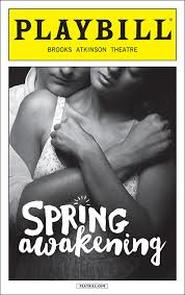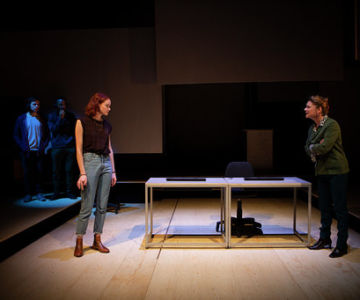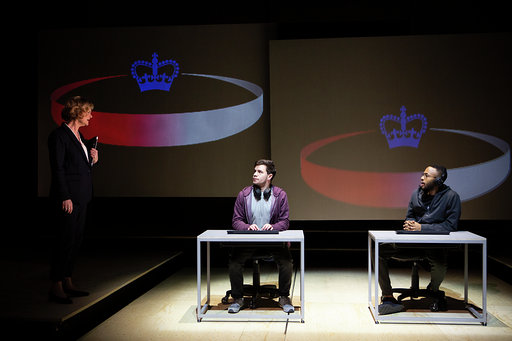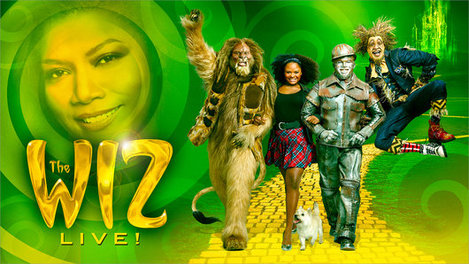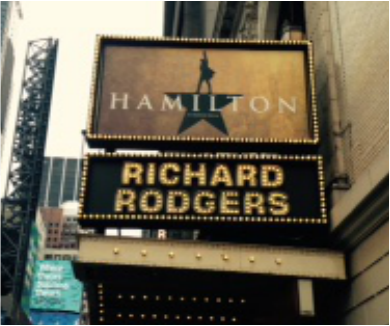 Lin-Manuel Miranda's "Hamilton" Is So Much Better Than All The Hype You Can't Even Begin to Fathomby Randi / October 6, 2015
Lin-Manuel Miranda's "Hamilton" Is So Much Better Than All The Hype You Can't Even Begin to Fathomby Randi / October 6, 2015 The arts seem to be the most accepting and tolerant of any field, don’t you think? Especially theatre. Theatre has long-welcomed and honored all kinds of non-straight-white-majority people for much longer than any other place. Nowadays, mainstream theatre seems to be making even more of a concerted effort to be inclusive. Of course “Hamilton” is the Broadway show making waves, and history, for representing American history using primarily black and Latino actors. But another current Broadway show is doing something that even that blockbuster can’t do: showcasing actors with disabilities. This season’s revival of “Spring Awakening” comes courtesy of Deaf West Theatre Company, and it stars deaf and hearing actors while presenting the show in both song and sign language.
It’s f-ing incredible.
I really like liking things, and I am trying to be nicer in my recaps because husband thinks I am too mean to rich and famous celebrities who really need me to be nice to them, but even though it might seem like I love so much, well, so much, I don’t. There are very few things I’ve witnessed that are equally faultless and brilliant, and devastating beyond belief, that haunt your thoughts for months on end. This is one of them.
“Spring Awakening”, based on the 1891 German play of the same name by Frank Wedekind, tells the story of sheltered, ill-informed 19th century German teenagers dealing with their sexual discovery. It doesn’t sound like ideal musical material but the original 2006 production won the Tony Award for best musical along with 7 others. And it’s awesome. With a rock score by Duncan Sheik (yes that Duncan Sheik) and Steven Slater, it’s a haunting, effective tale of the consequences of lying to children instead of educating them. So yeah, it’s like the most important show for people making decisions about America’s public school system to see.
The original production, starring the now-very-famous then-very-young Lea Michelle, Jonathan Groff, and John Gallagher Jr. (with an ensemble composed almost entirely of Broadway and Hollywood almost-as-famouses), seemed unbeatable. The cast was excellent, the music is remarkable, and the subject matter progressive and provocative. Everyone thought it was too soon for a revival of this modern show, especially considering no real problems with the original existed – revivals that happen so quickly should significantly rework the material to make it worth mounting, and the original production seemed to be as good as you can get. But Deaf West proved all the naysayers wrong, because this revival is so much stronger, more heartbreaking, and more earth-shatteringly brilliant than imaginable.
How is this possible when, at least I (and Tony voters) thought, the original was rock solid? Because the central themes of the show – the horror that happens when you fail to speak honestly to young people, refuse to fully or even partially educate them as to real life and not just Latin, really the ramifications of socially controlled ignorance – are enhanced and elucidated by making most of our main characters deaf. Half of the actors onstage are actually deaf – including Oscar-winner Marlee Matlin as the Adult Women – and signing throughout while hearing actors sing and speak. When signing isn’t possible given the staging or the actors present in a scene, subtitles appear on screens (written like a blackboard). Matlin shares the role of Adult Women with Emmy-winner Camryn Manheim, the latter of whom gets to yell as the mean teachers and Wendla’s dire mother, while the former breaks our hearts as Melchior’s mother who just can’t communicate with her son as she’d hope.
Most of the roles are doubled, actually, with deaf and hearing actors sharing the role. A pretty wonderful touch is that these roles, including the two non-Melchior main characters, Wendla and Moritz, are primarily played by the deaf actors, while their speaking and singing counterparts mainly shadow them, standing away from the action and away from the light, allowing the audience to see the deaf actor as the character and the hearing actor as perhaps the voice in their head.
Wendla (a glorious Sandra Mae Frank, voiced by Katie Boeck) is our tragic heroine, naïve as hell because of her teachers and crucially her mother, doomed to stay that way by her youth and experience. The show opens with Wendla asking her mother where babies come from, as her married older sister is having another child. Her mother is comically distraught over how difficult it is to tell her kid science, so she lies, saying that if you really love your husband with all your heart, god gives you a child. The audience laughs, because it’s a common funny situation, but of course we are soon reminded that education is everything, vital in every way, and the difficulty that ignorant adults have with it cannot excuse lack of honesty in educating kids.
Moritz (wonderful Daniel Durant, voiced by Alex Boniello) is the opposite of Wendla in demeanor, though just as tragic. While Wendla is sweet and unquestioning in her naiveté (for the most part), Moritz knows that shit in the world doesn’t make any sense, and his inability to handle things can be seen from space. His disturbing schoolroom scenes, in which he constantly spars with his stern, cold teachers, is heightened in this production by a little bit of history: He uses sign language, and the speaking teachers disapprove of it. This is an allusion to the infamous 19th century Milan Conference, in which sign language was banned by a biased congress in favor of forced oralism, which no regard to how this would actually affect deaf children. The ramifications of that terrible decision still persist, adding an extra layer to this aspect of the show.
As in the original, which won a Tony for JGJ, Moritz here is our emotional powerhouse, whose frustration with all the lies and ignorance and adults in his life becomes too much to handle, too reminiscent of so many people. His story reinforces how necessary communication is. I mean, the whole show does, but his in particular seems the most common in reality.
Both Wendla’s and Moritz’s deafness show their inability to communicate what they need to, though for Wendla it evidences her lack of awareness – she doesn’t even know what she doesn’t know – while for Moritz it’s his inability to explain himself and his needs, or at least for his words to get through to anyone. The various adult characters’ deafness reflects their refusal to listen to the kids in their lives or talk to them as humans.
Our lead character, Melchior (Austin P. McKenzie), on the other hand, is our highly intelligent, well-informed guy whose mother actually treats him like a person and is okay with him knowing necessary facts about life. He’s as smart as a teenager whose brain isn’t fully developed yet can be. As such, Melchior is one of the few characters played by a hearing actor who also uses sign language the whole time. His bilingual nature lets him educate Moritz and the other boys in his school about sex, it lets him talk honestly to teachers and parents, and it lets him have a relationship with his love Wendla. Their relationship provides much of the plot, and it’s complex: Wendla has no idea what sex really is or what it can do, so even though it is presented as consensual it’s really not. And even though Melchior does know the hard facts, he’s still too young to fully understand everything. Shit goes down, naturally, and that opening ‘funny’ conversation with her mother’s evasion proves important. The language and hearing barrier makes all the conflict and tragedy unspeakably worse and more intense, because it’s so clear to see where communication failed and things went wrong.
McKenzie’s Melchior, as the crux of the show, was a little weak for me, but then again Jonathan Groff’s shoes are impossible to fill, especially when a naturally hearing actor has to learn sign language and sign the whole time, while carrying most of the show. So I’m probably being too harsh. Only two other actors onstage, that I can recall, were both hearing and signing. One was Ali Stroker in the ensemble – Broadway’s first actor in a wheelchair. I wasn’t kidding when I said this show was hella inclusive and groundbreaking. I like that they showed that her physical disability doesn’t mean anything compared to her mind and abilities. The only other hearing and signing actor is Krysta Rodriguez, who was in the ensemble in the original production. The inimitable KR now plays Ilse, the much-abused girl whose abusive parents no longer provide a home for her, forcing her to a life on the streets, in a sort of druggie artists commune.
The uniqueness of this production led to several stellar moments in addition to the enhanced depth and meaning of the show overall. The big one was Ilse’s main scene, when she encounters a distraught Moritz in the woods before his suicide (plot spoilers are fair game for revivals, but I’ll try to avoid production spoilers. Also it happens in act one so come on). They used to be good friends, and so she senses he’s unhappy, but he hides how bad it is. They sing one of the best songs, “Don’t Do Sadness/Blue Wind” about how much easier life used to be and how things are generally shitty now. Ilse reluctantly says goodbye, leaving Moritz to shoot himself with a pistol he took from his uncommunicative, uncaring father. But in this show, Ilse comes back, to retrieve a scarf I think, and finds Moritz. The moment that happened next gives me chills just thinking about. It’s short, nothing on paper, but so unbelievably powerful and genius that I want to find director Michael Arden and hug him and slap him. It’s the kind of thing that made me almost throw up, I choke-gasped tears so hard. It’s almost too much, and it’s only a few seconds. (I’ll tell you if you wanna know.) This is when I went from ‘wow, this revival really transformed the show in a positive way’ to ‘wow, this is the most powerful piece of theatre maybe ever.’
Another stellar moment comes from another strong song (they’re all strong, dammit) – “The Dark I Know Well” – sung by one of the girls, Martha, about how her father abuses her and her dead-inside mother doesn’t care. Ilse joins in to commiserate about her former similar situation, and it’s a shattering song no matter what. But here, Martha (Treshelle Edmond (voiced by Kathryn Gallagher)) is deaf. She’s furiously signing the whole time, and it adds such heartache to it, knowing that she can’t and won’t do anything to stop it, and she implores her friends not to tell anyone. It’s like, oh let’s hear from one of the other girls, surely her story can’t be as mindnumbingly tragic as the oh wait it is.
There’s so much brilliance in this production that I really can’t say any more. Every movement, every decision was brilliant. I realize that it all seemed brilliant to me, a hearing person, for whom the signing was supporting the show and not determining it. I realize that it’s a much different experience for deaf audience members – at least 10 of whom I saw while waiting to enter the theatre, so this production really is a game-changer in audience makeup. I’m sure the production team had the hearing audience first and foremost in its mind, and I’m lucky that I got to see the vision of it as the team intended without missing much. I hope that it’s just as great for deaf audience members since it’s so rare for them to be considered, but I imagine there are many flaws from their perspective, things they missed, ASL that wasn’t as complex as the lyrics being sung, or maybe just difficulty seeing all the actors’ hands when necessary. However, no fault can be found with the ending. The ending is when everything falls to pieces, people are dead, abortion is illegal, Melchior is punished for his knowledge, truth is censored. We’re all quite sad, and the last plot-driven song is fucking BRUTAL, with the ghosts of Moritz and Wendla telling the imprisoned Melchior that they will always be there walking by his side. I mean. Damn. The last actual song is more like an epilogue, called “The Song of Purple Summer”. It’s one of my favorite songs of all time OF ALL TIME, and it’s about how even in the face of tragedy you still need to have hope that we can work together and make things better. or that things will just get better. I don’t know, it’s just hopeful. But in previous productions, it’s hard to feel that hope when you are like ‘BUT BUT BUT PRISON AND SUICIDE AND COAT-HANGER ABORTIONS WHAT DO YOU MEAN HAVE HOPE?’ Here it actually worked, because the most stellar moment of the show is the final image we see. I’m not going to tell you what it is (perhaps in the comments, if needed), but I’ll tell you this. I cry a lot in the theatre. I mean I cry a lot at all the arts but mostly the theatre, because my tears come if something is done well. I don’t care if it’s the happiest show and the cast is doing an energetic tap dance – if it’s really great, I’ma cry. Case in point: Sutton Foster and the last production of “Anything Goes” during the title song. That dance was perfect and it was a joyous scene. I cried. So this happens a lot. Well, my crying at this ending of “Spring Awakening” was indeed because it was done well, done perfectly actually, and all brilliant, but that’s not all. It was f-ing beautiful, sad and hopeful and everything that song and that show ever wished to accomplish. Hell, I’m pretty sure that final image was everything any show wants to accomplish. I thought my chest was imploding. The last time I had that much trouble breathing because of how hard I was crying, I ended up in the hospital with food poisoning and broken blood vessels all over my face.
Go see it. It ends in January. The end.
I really like liking things, and I am trying to be nicer in my recaps because husband thinks I am too mean to rich and famous celebrities who really need me to be nice to them, but even though it might seem like I love so much, well, so much, I don’t. There are very few things I’ve witnessed that are equally faultless and brilliant, and devastating beyond belief, that haunt your thoughts for months on end. This is one of them.
“Spring Awakening”, based on the 1891 German play of the same name by Frank Wedekind, tells the story of sheltered, ill-informed 19th century German teenagers dealing with their sexual discovery. It doesn’t sound like ideal musical material but the original 2006 production won the Tony Award for best musical along with 7 others. And it’s awesome. With a rock score by Duncan Sheik (yes that Duncan Sheik) and Steven Slater, it’s a haunting, effective tale of the consequences of lying to children instead of educating them. So yeah, it’s like the most important show for people making decisions about America’s public school system to see.
The original production, starring the now-very-famous then-very-young Lea Michelle, Jonathan Groff, and John Gallagher Jr. (with an ensemble composed almost entirely of Broadway and Hollywood almost-as-famouses), seemed unbeatable. The cast was excellent, the music is remarkable, and the subject matter progressive and provocative. Everyone thought it was too soon for a revival of this modern show, especially considering no real problems with the original existed – revivals that happen so quickly should significantly rework the material to make it worth mounting, and the original production seemed to be as good as you can get. But Deaf West proved all the naysayers wrong, because this revival is so much stronger, more heartbreaking, and more earth-shatteringly brilliant than imaginable.
How is this possible when, at least I (and Tony voters) thought, the original was rock solid? Because the central themes of the show – the horror that happens when you fail to speak honestly to young people, refuse to fully or even partially educate them as to real life and not just Latin, really the ramifications of socially controlled ignorance – are enhanced and elucidated by making most of our main characters deaf. Half of the actors onstage are actually deaf – including Oscar-winner Marlee Matlin as the Adult Women – and signing throughout while hearing actors sing and speak. When signing isn’t possible given the staging or the actors present in a scene, subtitles appear on screens (written like a blackboard). Matlin shares the role of Adult Women with Emmy-winner Camryn Manheim, the latter of whom gets to yell as the mean teachers and Wendla’s dire mother, while the former breaks our hearts as Melchior’s mother who just can’t communicate with her son as she’d hope.
Most of the roles are doubled, actually, with deaf and hearing actors sharing the role. A pretty wonderful touch is that these roles, including the two non-Melchior main characters, Wendla and Moritz, are primarily played by the deaf actors, while their speaking and singing counterparts mainly shadow them, standing away from the action and away from the light, allowing the audience to see the deaf actor as the character and the hearing actor as perhaps the voice in their head.
Wendla (a glorious Sandra Mae Frank, voiced by Katie Boeck) is our tragic heroine, naïve as hell because of her teachers and crucially her mother, doomed to stay that way by her youth and experience. The show opens with Wendla asking her mother where babies come from, as her married older sister is having another child. Her mother is comically distraught over how difficult it is to tell her kid science, so she lies, saying that if you really love your husband with all your heart, god gives you a child. The audience laughs, because it’s a common funny situation, but of course we are soon reminded that education is everything, vital in every way, and the difficulty that ignorant adults have with it cannot excuse lack of honesty in educating kids.
Moritz (wonderful Daniel Durant, voiced by Alex Boniello) is the opposite of Wendla in demeanor, though just as tragic. While Wendla is sweet and unquestioning in her naiveté (for the most part), Moritz knows that shit in the world doesn’t make any sense, and his inability to handle things can be seen from space. His disturbing schoolroom scenes, in which he constantly spars with his stern, cold teachers, is heightened in this production by a little bit of history: He uses sign language, and the speaking teachers disapprove of it. This is an allusion to the infamous 19th century Milan Conference, in which sign language was banned by a biased congress in favor of forced oralism, which no regard to how this would actually affect deaf children. The ramifications of that terrible decision still persist, adding an extra layer to this aspect of the show.
As in the original, which won a Tony for JGJ, Moritz here is our emotional powerhouse, whose frustration with all the lies and ignorance and adults in his life becomes too much to handle, too reminiscent of so many people. His story reinforces how necessary communication is. I mean, the whole show does, but his in particular seems the most common in reality.
Both Wendla’s and Moritz’s deafness show their inability to communicate what they need to, though for Wendla it evidences her lack of awareness – she doesn’t even know what she doesn’t know – while for Moritz it’s his inability to explain himself and his needs, or at least for his words to get through to anyone. The various adult characters’ deafness reflects their refusal to listen to the kids in their lives or talk to them as humans.
Our lead character, Melchior (Austin P. McKenzie), on the other hand, is our highly intelligent, well-informed guy whose mother actually treats him like a person and is okay with him knowing necessary facts about life. He’s as smart as a teenager whose brain isn’t fully developed yet can be. As such, Melchior is one of the few characters played by a hearing actor who also uses sign language the whole time. His bilingual nature lets him educate Moritz and the other boys in his school about sex, it lets him talk honestly to teachers and parents, and it lets him have a relationship with his love Wendla. Their relationship provides much of the plot, and it’s complex: Wendla has no idea what sex really is or what it can do, so even though it is presented as consensual it’s really not. And even though Melchior does know the hard facts, he’s still too young to fully understand everything. Shit goes down, naturally, and that opening ‘funny’ conversation with her mother’s evasion proves important. The language and hearing barrier makes all the conflict and tragedy unspeakably worse and more intense, because it’s so clear to see where communication failed and things went wrong.
McKenzie’s Melchior, as the crux of the show, was a little weak for me, but then again Jonathan Groff’s shoes are impossible to fill, especially when a naturally hearing actor has to learn sign language and sign the whole time, while carrying most of the show. So I’m probably being too harsh. Only two other actors onstage, that I can recall, were both hearing and signing. One was Ali Stroker in the ensemble – Broadway’s first actor in a wheelchair. I wasn’t kidding when I said this show was hella inclusive and groundbreaking. I like that they showed that her physical disability doesn’t mean anything compared to her mind and abilities. The only other hearing and signing actor is Krysta Rodriguez, who was in the ensemble in the original production. The inimitable KR now plays Ilse, the much-abused girl whose abusive parents no longer provide a home for her, forcing her to a life on the streets, in a sort of druggie artists commune.
The uniqueness of this production led to several stellar moments in addition to the enhanced depth and meaning of the show overall. The big one was Ilse’s main scene, when she encounters a distraught Moritz in the woods before his suicide (plot spoilers are fair game for revivals, but I’ll try to avoid production spoilers. Also it happens in act one so come on). They used to be good friends, and so she senses he’s unhappy, but he hides how bad it is. They sing one of the best songs, “Don’t Do Sadness/Blue Wind” about how much easier life used to be and how things are generally shitty now. Ilse reluctantly says goodbye, leaving Moritz to shoot himself with a pistol he took from his uncommunicative, uncaring father. But in this show, Ilse comes back, to retrieve a scarf I think, and finds Moritz. The moment that happened next gives me chills just thinking about. It’s short, nothing on paper, but so unbelievably powerful and genius that I want to find director Michael Arden and hug him and slap him. It’s the kind of thing that made me almost throw up, I choke-gasped tears so hard. It’s almost too much, and it’s only a few seconds. (I’ll tell you if you wanna know.) This is when I went from ‘wow, this revival really transformed the show in a positive way’ to ‘wow, this is the most powerful piece of theatre maybe ever.’
Another stellar moment comes from another strong song (they’re all strong, dammit) – “The Dark I Know Well” – sung by one of the girls, Martha, about how her father abuses her and her dead-inside mother doesn’t care. Ilse joins in to commiserate about her former similar situation, and it’s a shattering song no matter what. But here, Martha (Treshelle Edmond (voiced by Kathryn Gallagher)) is deaf. She’s furiously signing the whole time, and it adds such heartache to it, knowing that she can’t and won’t do anything to stop it, and she implores her friends not to tell anyone. It’s like, oh let’s hear from one of the other girls, surely her story can’t be as mindnumbingly tragic as the oh wait it is.
There’s so much brilliance in this production that I really can’t say any more. Every movement, every decision was brilliant. I realize that it all seemed brilliant to me, a hearing person, for whom the signing was supporting the show and not determining it. I realize that it’s a much different experience for deaf audience members – at least 10 of whom I saw while waiting to enter the theatre, so this production really is a game-changer in audience makeup. I’m sure the production team had the hearing audience first and foremost in its mind, and I’m lucky that I got to see the vision of it as the team intended without missing much. I hope that it’s just as great for deaf audience members since it’s so rare for them to be considered, but I imagine there are many flaws from their perspective, things they missed, ASL that wasn’t as complex as the lyrics being sung, or maybe just difficulty seeing all the actors’ hands when necessary. However, no fault can be found with the ending. The ending is when everything falls to pieces, people are dead, abortion is illegal, Melchior is punished for his knowledge, truth is censored. We’re all quite sad, and the last plot-driven song is fucking BRUTAL, with the ghosts of Moritz and Wendla telling the imprisoned Melchior that they will always be there walking by his side. I mean. Damn. The last actual song is more like an epilogue, called “The Song of Purple Summer”. It’s one of my favorite songs of all time OF ALL TIME, and it’s about how even in the face of tragedy you still need to have hope that we can work together and make things better. or that things will just get better. I don’t know, it’s just hopeful. But in previous productions, it’s hard to feel that hope when you are like ‘BUT BUT BUT PRISON AND SUICIDE AND COAT-HANGER ABORTIONS WHAT DO YOU MEAN HAVE HOPE?’ Here it actually worked, because the most stellar moment of the show is the final image we see. I’m not going to tell you what it is (perhaps in the comments, if needed), but I’ll tell you this. I cry a lot in the theatre. I mean I cry a lot at all the arts but mostly the theatre, because my tears come if something is done well. I don’t care if it’s the happiest show and the cast is doing an energetic tap dance – if it’s really great, I’ma cry. Case in point: Sutton Foster and the last production of “Anything Goes” during the title song. That dance was perfect and it was a joyous scene. I cried. So this happens a lot. Well, my crying at this ending of “Spring Awakening” was indeed because it was done well, done perfectly actually, and all brilliant, but that’s not all. It was f-ing beautiful, sad and hopeful and everything that song and that show ever wished to accomplish. Hell, I’m pretty sure that final image was everything any show wants to accomplish. I thought my chest was imploding. The last time I had that much trouble breathing because of how hard I was crying, I ended up in the hospital with food poisoning and broken blood vessels all over my face.
Go see it. It ends in January. The end.


